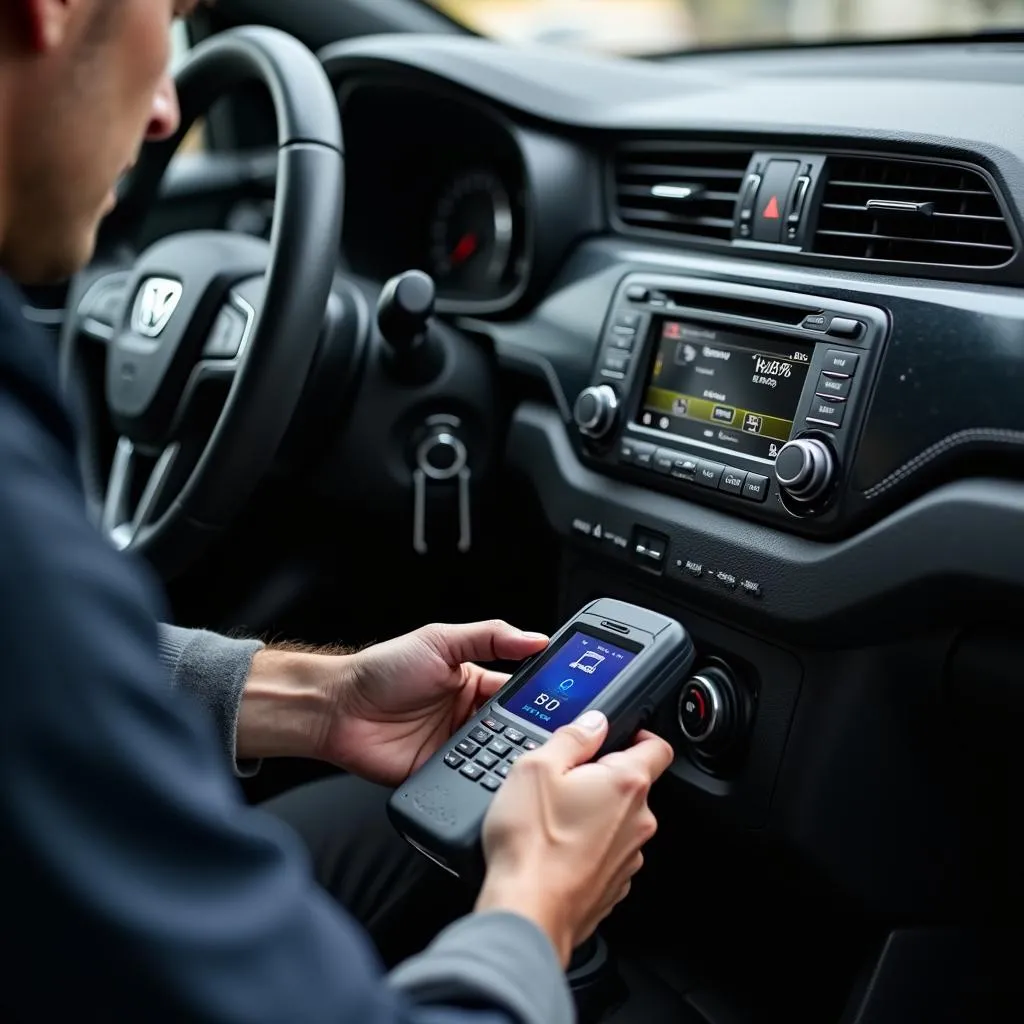A brake warning light on your 2009 Honda Civic accompanied by squealing noises can be a disconcerting experience. It’s crucial to understand why this happens and how to address it promptly. This guide will help you navigate the common causes and solutions for this issue.
Why Is My Brake Warning Light On and My Brakes Squealing?
The brake warning light and squealing noises are often indicators of a problem with your brake system. These problems can range from minor issues like worn brake pads to more serious concerns like a faulty brake booster. Here’s a breakdown of the most frequent culprits:
1. Worn Brake Pads
The most common reason for brake warning lights and squealing is worn brake pads. Your car’s brake pads are designed to wear down over time. As they do, they eventually reach a point where they need to be replaced. Worn brake pads will trigger the warning light and produce a high-pitched squealing sound.
Expert Insight
“If you hear a squealing noise when braking, it’s best to check your brake pads immediately. Delaying this can lead to more serious problems and potentially damage other components of the braking system.” – John Smith, Automotive Technician
2. Low Brake Fluid
Another reason for a brake warning light is low brake fluid. Brake fluid helps transfer pressure from the brake pedal to the calipers, which then squeeze the brake pads against the rotors. If the fluid level drops, the warning light may illuminate.
3. Faulty Brake Booster
The brake booster is a vacuum-powered system that assists the driver in applying brake pressure. A malfunctioning brake booster can cause the brake pedal to feel spongy and can also trigger the warning light.
4. Faulty Wheel Speed Sensor
Wheel speed sensors play a crucial role in the stability control system and anti-lock braking system (ABS). A faulty wheel speed sensor can trigger the brake warning light.
5. Parking Brake Issues
A stuck parking brake can also trigger the warning light. This is usually accompanied by other symptoms such as difficulty shifting gears or a dragging sensation when driving.
How to Troubleshoot a 2009 Honda Civic Brake Warning Light
If your 2009 Honda Civic displays a brake warning light and squealing noises, here’s what you should do:
- Check the Brake Fluid: Check the brake fluid reservoir located under the hood. If the fluid is low, top it up with the appropriate type of brake fluid.
- Inspect the Brake Pads: Carefully inspect the brake pads on all four wheels. If the pads are worn down to the wear indicator, they need to be replaced.
- Have it Diagnosed: If you’re unable to identify the problem, it’s best to have your car inspected by a qualified mechanic. They have the tools and expertise to pinpoint the problem and recommend the appropriate solution.
Is My 2009 Honda Civic Safe to Drive?
If your 2009 Honda Civic has a brake warning light and squealing noises, it’s generally not safe to continue driving. You risk reduced braking performance, which can be extremely dangerous.
Expert Insight
“Even if you can still apply brakes, the diminished braking power can lead to longer stopping distances and potentially dangerous situations.” – Sarah Johnson, Automotive Mechanic
How to Prevent Brake Warning Light Issues
Here are some tips to prevent brake warning light issues:
- Regular Maintenance: Adhere to your car’s recommended maintenance schedule.
- Check the Fluid Levels: Periodically check the brake fluid levels and top them off as necessary.
- Avoid Aggressive Driving: Excessive braking and aggressive driving can wear down brake pads faster.
- Listen for Changes: Be aware of any changes in braking performance and listen for any unusual noises.
FAQs
Q: Can I replace my brake pads myself?
A: While some DIYers may feel comfortable replacing brake pads, it’s a job best left to a professional mechanic. The procedure involves specialized tools and knowledge of safety protocols.
Q: How long do brake pads last?
A: The lifespan of brake pads varies depending on driving habits, road conditions, and maintenance. However, most brake pads last around 25,000 to 50,000 miles.
Q: What is the cost of replacing brake pads?
A: The cost of replacing brake pads can vary depending on the make and model of your car, the type of pads, and the labor costs in your area.
Q: Can a faulty brake booster be repaired?
A: While some brake booster issues may be repairable, they often require replacement.
Q: How can I find a qualified mechanic to inspect my car?
A: You can ask for recommendations from friends and family or search online for reputable mechanics in your area.

